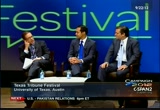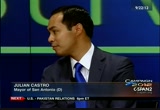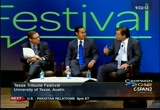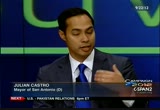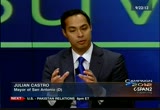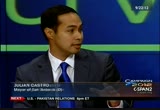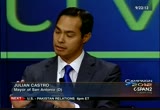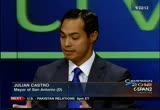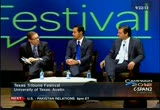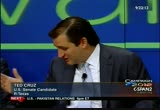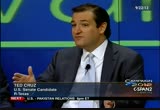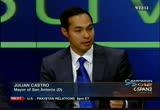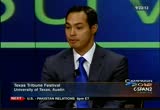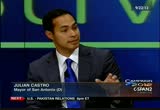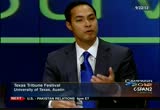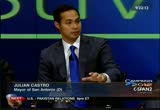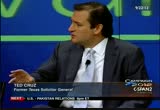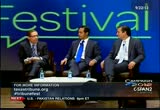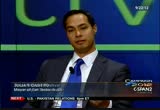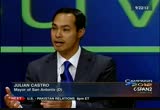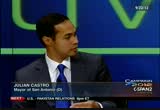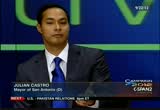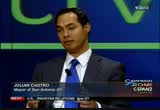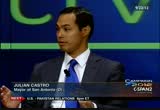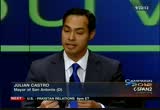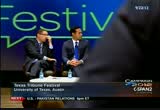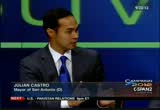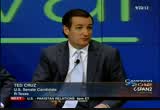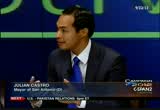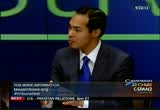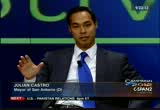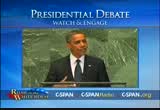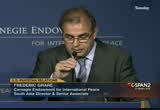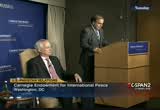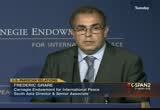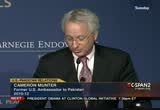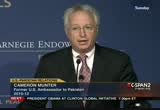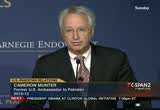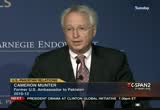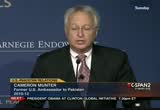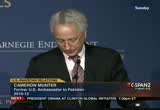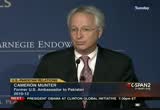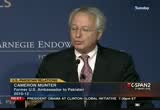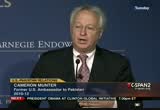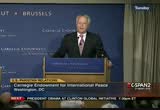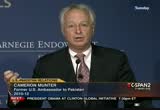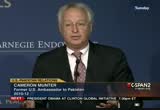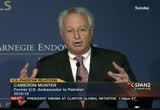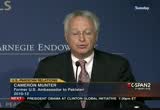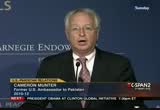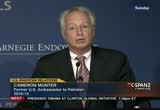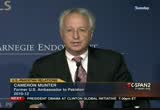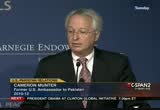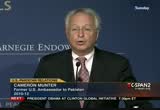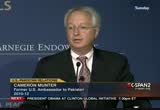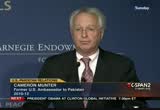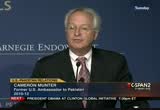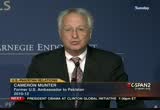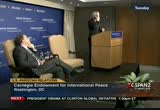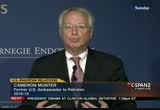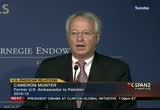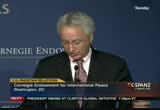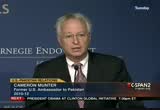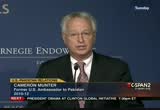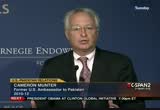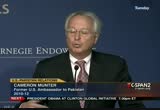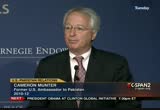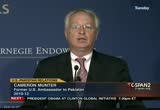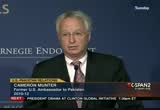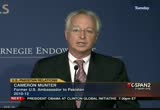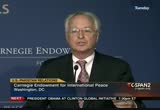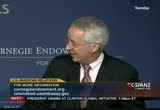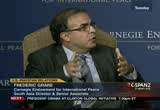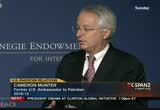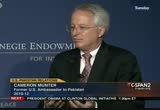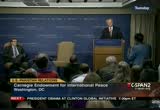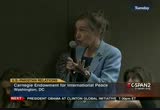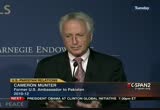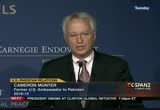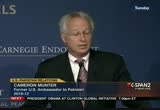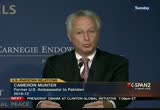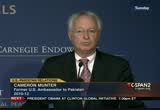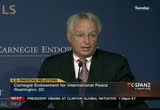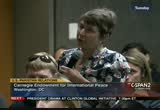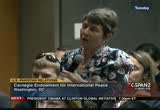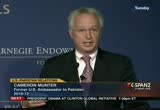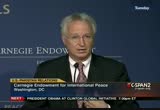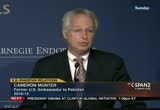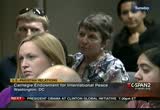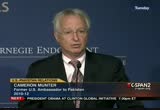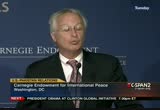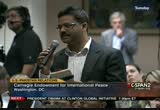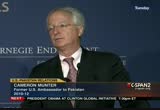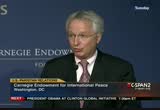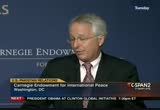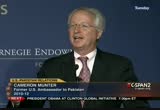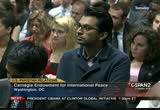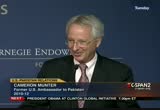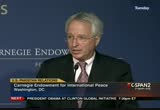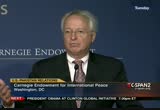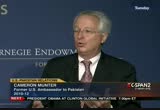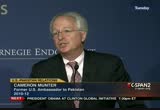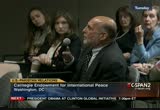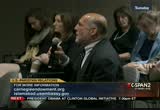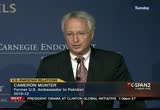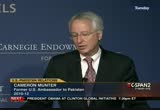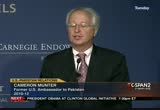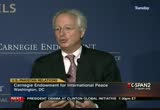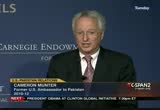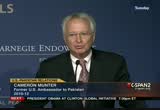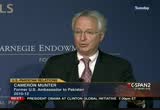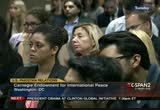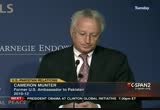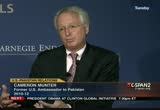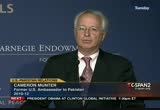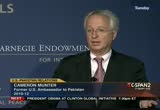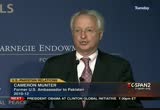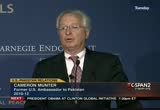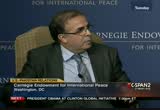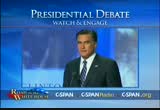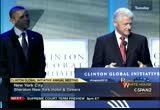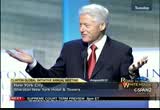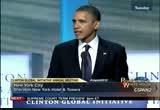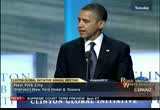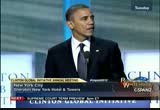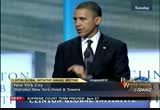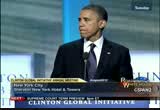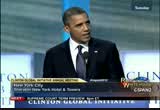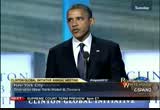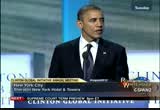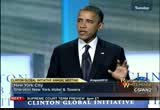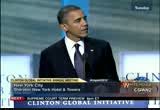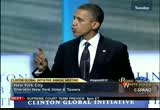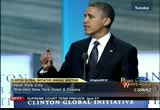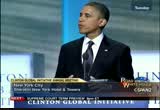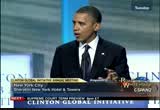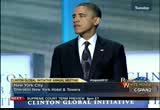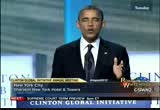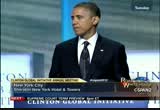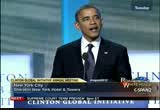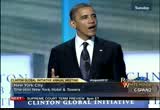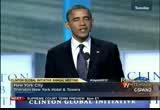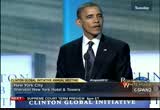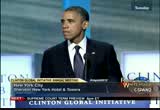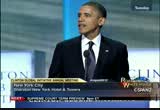tv U.S. Senate CSPAN September 27, 2012 5:00pm-8:00pm EDT
5:00 pm
being here. you both had quite a summer. mayor castor, let me ask you to reflect on this summer. -- mayor castro, let me ask you to reflect on this summer. >> first, a greenwich solutions for of and for a wonderful event. -- first, congratulation for evident for a wonderful event -- for evan for a wonderful event. it was like throwing a claustrophobic into a closet and then taking away the key. [laughter] i think what we have seen in historical cycle of some of what we saw in 2010 -- in this 2012
5:01 pm
cycle is in some of what we saw in 2010. people are still committed to the fundamental ideals that make the nine states special, that make it a land of opportunity, that make it a believe the greatest country in the world. in the same time gun they are nervous. -- at the same time, they are nervous. it has been an exciting summer appeared i also learned that my daughter knows have to flip her hair. [laughter] >> she does. most famous child in america. the nation also learn you have a twin brother. they said that the democrats love julien castro so much, they have an extra one. [laughter] mr. cruz, where did you learn
5:02 pm
about yourself and what did you learn about the state of politics in this country? >> at the convention, i was just glad that i did not fall off stage. when i came out, the plan had been there would be a two-minute video. as happens at these conventions, they were running a bit late. they said okay, we will cancel the video. you had right on down and instead of just a clean stage, you had a podium and the teleprompter going down and there was literally aboua 15-fot tent going down behind me. >> were you surprised at the convention about anything you her saw? you have been pretty clear about your own views. but what did you hear?
5:03 pm
>> i thought the convention was fantastic. but the there was an energy on the ground. in terms of what i have learned and experienced in the last year-and-a-half, it truly has been -- the biggest thing in terms of our primary is that it was really a testament to the grassroots. in any other cycle, what happened in the republican primary could not have happened. in any ordinary year, the should have been a very easy lay down. we were out-spent three-one. when we started, i was a 2%. >> the primaries back in march. you may not be sitting here. >> thank god for small miracles. >> you published an opinion piece in "the wall street *" this week where you say that america is that a crisis point. can you explain that to?
5:04 pm
>> i think we are at a fiscal and economic cliff. i think we have pursued government spending programs that have created a debt that is out of control. at the convention come after talking, i went home to my hotel at 1:30 a.m. and i was looking on my iphone at twitter. and the comedian paula pound stone had sent a tweet that evening. i don't know her, but she said " ted cruz just said that, when his daughter was born, the debt was $5 trillion and now it is $16 trillion. what the heck did she do?" [laughter] >> you think the debt is putting the nation in crisis. >> along with government spending, is causing the dead. we have seen a growing expansion in the power of the federal government. it is crippling small
5:05 pm
businesses. >> you are the national co-chair of the obama-bided campaign. >> i would put the challenge that we have as a nation in a different context. and say that, to the extent that we are a nation in "crisis," although i would not describe it as that because i believe that we can fundamentally overcome this and that we can do it in a fairly rational and reasonable way, i think the challenges that we have now had more than a generation of folks who are not willing to ask americans to sacrifice and to be realistic about how we take on our biggest challenges. for instance, everyone remembers the republican debate where they asked whether you would take the
5:06 pm
bargain of one dollar's worth of tax increases or $10 worth of basically tax cuts and everybody raised their hands and said they would not accept that. we have become a country where -- it is not just one side, both sides, but more one side now than ever is not willing to be realistic about how we can tackle these challenges. if there is a crisis that i see in the united states for the long term, it is not the temporal issue of how we will deal with money. because i am very confident we will be able to deal with that. it is how will we bring that -- bring back our sense of what we can accomplish together as americans when we are realistic about those challenges. that is the thing i think about
5:07 pm
the word "crisis" in this country. >> mayor castro is not the first to suggest that. for 10 years now, we heard that the government is not asking all of us to do enough. >> it is interesting. the word "sacrifice," when i hear a politician say that, it usually means grab your wallet. it usually means increasing taxes. and i will give president obama credit to in his the first presidential candidate since walter mondale to run explicitly on a platform that he will raise taxes. >> he is saying he will raise taxes on the wealthy. >> according to the supreme court, he already has raised taxes.
5:08 pm
that was the basis on which the supreme court of held obamacare, that it was a tax increase. >> to mayor castro's point, people who have more are being asked to sacrifice. you do not agree with that. >> i do not agree with that. but me say two things. if you look historically, such spending has been 20% of gdp. federal spending has been 18% of gdp. i think the problem is we're spending too much. in the last three years, federal spending has gone from 20% of gdp to 25% of gdp. that is a fundamental structural shift and it is produced -- it has produced record-setting deficits and putting us in a path of greece and where much of europe are. the economy is teetering on the
5:09 pm
edge of recession. the were seen can do is jacked up taxes on small businesses and entrepreneurs or job creators. that makes it all the more likely to push us into a recession. and for the 23 million people who struggling for work, the worst thing to do is hurt the small businesses that create those jobs. >> it is fair to say that the president has reduced taxes. he has reduced taxes for small businesses 18 times. he cut taxes for '95 -- for 95% of families out there. the question is do we ask everybody to sacrifice? when you look at the marginal rate in the united states, when ronald reagan took office, the marginal office with 71% to 72%. it is interesting to me that the greatness that people speak of in terms of the united states, when we talk about the 1940's, the 1950's, the 1960's, 1970's, the marginal rate that folks
5:10 pm
paid was much greater. nobody says we will go back to that. at the same time, during the clinton years, we had marginal rates that were a little bit higher than they are now and we had some of the best economic times that the country has ever seen. that is what i'm talking about. my concern for the country is that all of this heat has been generated around this issue instead of light and analysis and a sober look at the role that every american play, should play in strengthening our country. that is the concern i have in the long run. >> i want to pick up mr. cruz's suggestion that the economy is in trouble from -- is in trouble. texas has endured. but san antonio has had a tough couple of years. the census bureau report brought these numbers appeared between
5:11 pm
2009 and 2011, unemployment in san antonio went up by more than a full point. needed household income has gone down. you know how tough the economy is. you're leaving a city that has been bearing some of the brunt. can you talk about that? few dispute that the economy is in a world of hurt? whoever's responsibility that is. >> i think every american would say that the economy is not where we wanted to be. but if you look nationally, there is no question that we have had 30 months of private- sector job growth. 4.6 million new jobs that were created during that time. at the same time, if we were to go right now to the archives of the university and pull out the front page headlines from four years ago and look at what was happening at this 0.4 years ago, where we were losing hundreds of thousands of jobs.
5:12 pm
in the month when president obama took office, we lost almost 800,000 jobs that month. there was talk of another depression at that time. whether we are talking about taxes or san antonio or anyplace, are we were we want to be? no. but are we better off than where we were? when we're talking about going into another depression and the banks collapsing and so on and so on? absolutely. there is no question in my mind. >> this question has become a part of his campaign. mayor castro makes the case that there have been 30 consecutive months of job growth. and when the president came into office, things were significantly worse now. would you like to take issue with this? >> right now, tragically, work- force participation is at the lowest rate it has been in 30 years.
5:13 pm
you mentioned john stuart been normally, you can get a barometer of where the country is by the late-night comics. >> i thought you said comics. [laughter] >> i will let even get into the midst of that. >> but letterman is getting older and we will have a vacant chair at some point. [laughter] >> so what did jay leno say. >> they went from 8.3% to 8.1% and the reason was that three and 60,000 people dropped out of the work force entirely, stop looking for work, which is the only reason the numbers went down. nearly 400,000 people give up hope they could find work. so obama has a strategy for re- election which is encouraging even more people to stop looking for what. >> but the question is not whether the and employment rate
5:14 pm
is 8.1% or 8.3%. the question is whether it is better than when the president took office? >> absolutely not. when you have the worst employment participation in 30 years -- in the three and a half years of president obama tenure, gdp growth has been 1.5%. historically, for the last seven years, it has been 3.7%. we have had less than half the historical average pared by contrast, in 1984, gdp growth was 7.2% print what does that mean when the economy is growing, when small businesses are prospering? they are creating new jobs and people are able to find work. it creates opportunity for everyone. what we have unfortunately is
5:15 pm
small business after small business facing crushing uncertainty. the single biggest question you hear from business leaders is they don't know between obamacare and dodd-frank and the offshore drilling moratorium in texas. but entrepreneurs expressed to me is the sense of great uncertainty. what will the federal regulators do? and the president keep promising to raise everyone's taxes, which is causing small businesses to keep capital on the sidelines and not deploy it because they have so much uncertainty. >> i am not certain that the president is going to raise their once taxes. but you know what the growth rate was -- do a deal with the gdp growth rate was at the end of bush? >> no. [laughter] >> the 4.6 million new private-
5:16 pm
sector jobs created with this president is more than were created under george bush. you have a president who basically inherited one of the worst economies that this country has ever seen. of course, what will you do with a falling object? that object will fall and you have to pick up and the rise back up will be a little bit slower. what you have seen is that coming in the 30 months, 4.6 million new jobs, he has already created more jobs centers w. bush. this is a president who understands how to get the economy going and this election should be, between these two candidates, who actually has a plan about the future? given his record, i have more confidence that president obama can get that done than governor romney appeared >> -- then governor romney. >> right now, you're trying to
5:17 pm
get a sales tax increase to pay for pre-k. can you defend, sitting next to someone who does not like texas famously, the decision to brought to market with a tax increase even for something you so strongly believe in? many mayors are with you, but there are a lot of elected officials and san antonio who are not with you. >> basically, i fundamentally believe that brainpower is the currency of success. in the 21st century global economy. those communities that created will be the communities that thrive in our market economy. and those communities that do not will be the ones who fall behind. san antonio, i believe, needs to make a huge investment in education. that investment is not limited to more money.
5:18 pm
it also means getting parents involved. it also means expecting more from everybody along whole education ecosystem, from administrators to policy-makers to teachers come expecting more out of everyone. so what i have on the table in san antonio is basically a 1/8 cent sales tax that will cost the median household in the city $7.81 per year. mind you, every day in texas, it cost $359.81 to keep a juvenile incarceration. what we have on the table is the opportunity to educate more than 22,404-year-olds with -- 22,400 4-year-olds with high quality pre-k. >> i don't believe that taxes
5:19 pm
are inherently evil. >> that will be tweeted, by the way. [laughter] give them a second. [laughter] >> i do believe that taxes are inherently evil. i'd like them and nobody likes the impaired but it will the voters in san antonio that there is no way to sugarcoat this. i am asking you for this tax increase. more than that, i believe in you. i believe that may put it in front of you, you can make a decision as to whether or not you want to make this investment. so are you willing to pay $7.81 if we meet you halfway by ensuring accountability, ensuring that we require parents to be involved in their child's education because they're probably the most important shepherds of what happens in a child's life. we require performance audits
5:20 pm
and we set this with a definitive time from the eight years. in eight years, you get to vote on this again. you can either keep it or leave it based on how it has performed. and we set actual schools that make it transparent. what we will have to decide in texas, especially on the issue of education, because brainpower is so important to economic success in the future, is are we willing to make the investment? and if we do, i also believe that we have the right t expect more from everybody in the education ecosystem, from parents to policy makers to a administrators, everybody down . >> mr. cruz, sounds like he is telling the community, you can control it. if you want money for pre-k, you can vote to support or reject. do you have an issue with that? >> i agree with you. i commend mayor caster for taking leadership on an issue that he is passionate about pair and for taking it to the voters
5:21 pm
of san antonio. i think that is where the important issues of education should be decided come at the state level and the local level. >> you would vote no, however. >> if i were a citizen of san antonio, i would look at the merits of the argument there is a world for taxes and thi that government can provide. that is a choice for the citizens of san antonio to make. on the merits, is it the thing that makes sense for them to make. if it works, you can look at the results and other communities can make the decisions. one of the reasons i do like federal decisions that are forced from washington all across the country is that different communities have different needs. and what might be a good policy in san antonio may be a terrible policy in laredo or new york city. >> the mayor says that he does not believe taxes are inherently evil but with qualifications.
5:22 pm
you? word.il is a strong roa >> it is. and that is what i am asking you. do you think taxes are inherently evil or do you? >> i think taxes are morally neutral. what is done with it can be good or bad. >> let me move on to health care. [laughter] i tried. this week, the census bureau that i alluded to earlier, they also talked about the state of health care in this country can it said that texas now has 5.8 million uninsured citizens, down as a percentage of our overall population. now 23% of our overall population is uninsured. we have the most in the country. along with that, i report by stephen murdoch can michael klein said that, if only we would embrace the federal health care reform, we could insure 3 million texans by 2014.
5:23 pm
in a state with the most citizens uninsured in the country, why would we not try something that at least some people believe would ensure more than 3 million of our fellow citizens? >> right now, the nation is struggling with obamacare and what will happen if it is fully implemented. i think that is one of the central issues at stake in november. it is one of the central issues at stake in the presidential race and in the congressional and senate race progressed the fact is that you would vote to repeal. >> i am an answer to the -- i am an enthusiastic vote to repeal. if you look at what is happening with obamacare already, you see small businesses, employers drop health insurance -- talking about dropping health insurance if obama's is care is implemented. if it is fully implemented, i believe, it will lead toward shifting more and more the citizenry to government-provided
5:24 pm
insurance, to providing -- to moving us toward a single-payer system. manyhe did not go all the way to a single-payer system immediately. i think that is zero -- i think that is what obamacare is headed toward defeat is fully implemented. every nation on earth that has implemented social health care, government-run health care, you have seen poor quality. you have seen rationing. you have seen waiting lines provide don't think that is what americans want. and i also think that obamacare was implemented with a government arrogance that was extraordinary. there has been no major social legislation passed in modern times, other than obamacare, that was on a pure party-line vote ran down the throat both of the opposition and of the
5:25 pm
american people. >> you will double down on the idea that the affordable care act, which has been found constitutional, is socialized medicine. >> i think it is designed to lead as inexorably toward socialized medicine. >> i guess that you have a different point of view. >> i do. let's take a look at what the facts are. it has been fascinating to hear the discussion about obamacare over the last couple of years. every time you hear it, it is anecdote after anecdote, year after fear about what will happen, but what people are talking, snippets of conversation here and there. you started with a very good fact, which is that the percentage of folks who actually have health care, not just in texas, but in the united states of the last year has gone up for the first time in a very long time. the reason it has gone up is because now folks who are up to
5:26 pm
26 years old can stay on their parents' plan. pre-existing conditions are not some paperwork excuse for an insurance company to deny you benefits that you have earned and paid for. and so the only thing that we have out of obamacare are a positive so far been everything else, well, small-business owners, they are worried about it or is there a chilling effect that is happening because of it? there's no empirical evidence for that. it is all about some future that is out there that is painted very darkly. although, i will say that we do have a model to look at and it is massachusetts. it is romneycare. >> i wouldn't vote for that either. but but what we saw in massachusetts was that folks like it and it has worked well and it would be a great thing if the governor would embrace what he accomplished.
5:27 pm
i would agree with him that it was a good way for massachusetts to go. and in 2015, 2016, 2017, if mr. cruz is elected this year, if he is up for reelection in 2018, i bet that folks will be singing a different tune about obamacare. >> to the specific point that the mayor made about pre- existing conditions and allowing young people to remain for a certain time on their parents' health insurance and even governor romney, whom you support for president has said that he would keep some of those things in any health care plan that he would put forward if he were elected president. are you ok with preexisting conditions? are you ok with keeping people on their parents' health care insurance to 26? are there things that you would permit or would repeal the whole thing? >> no. >> so you are against people being able to get insurance despite pre-existing conditions?
5:28 pm
>> let me be clear. candidates and politicians like to come with goodies print they say we will give you something and it will be great. but they never focused on the cost. my view of how to approach health care reform -- this is a complicated issue that does not admit to a simple band a solution. it is fundamentally different from the approach of president obama. i think health care reform should expand markets, expand competition and empower consumers and patients and disempower government bureaucrats from second- guessing the decisions that are made between a patient and a doctor. what does that mean specifically? the three reforms a think would be most important would be, number one, allowing people to purchase health insurance across state lines. why is that? because that would create a true 50-state national market for low-cost catastrophic health care. part of the problem, every time politicians say that every
5:29 pm
health plan must include the following bills and whistles and they give away all the stuff, it has the inevitable effect of driving the cost of health insurance for everybody. and one of the biggest reasons so many people in texas and nationally don't have health insurance is because it is so expensive. if we had a 250-state national market with low-cost catastrophic care, that would expand access. chris so buying across state lines would be number one. what are two and three? >> #2 is sitting in a tax- deferred way to take care of their health needs. i think that has significant impact, both in terms of manpower and consumers and in terms of constraining costs. >> so that is no. 2. >> #3, working to delink health insurance from employment p.m. it is a historical accident that most of us to get -- from employment.
5:30 pm
it is a historical accident that most of us get our health insurance from our employment. we don't live in the 1940's and 1950's were people go to work for one company for 50 years. if you or i lose our jobs, we don't lose our life insurance, home insurance, car insurance. >> so portability is a concern. >> and insurance is personal and you own it and it travels with you regardless of your job. that goes a long way to solving the problem of pre-existing conditions. you're not losing your health care. >> i want the mayor to respond but i ask you two specific questions and i want you to answer them pierre do you support allowing people to buy insurance despite preexisting conditions? do you support the principle of allowing young people to stay on their parents' health insurance until age 26? >> the center those one at a time. let's start with age -- let's answer those one at a time. let's start with age 26.
5:31 pm
that will increase the cost of insurance coverage for everyone. >> which you do not want to see happen been so i take that as a no. >> it is a no as a government mandate. but if you allow people to buy insurance across state lines, some policies will be available that to come if you want to buy this policy and cover your kids up to age 26, you can do so in pay higher premiums. i don't to jack up everyone's premiums because these things are not free. >> men they know or the possibility of that happening are definitely -- happening organically, definitely. >> yes. >> what about preexisting conditions? >> insurance companies should not dump you when you get sick. but if you have demanded that you must be covered regardless of pre-existing conditions, that is not insurance. >> if i go to get insurance and the company wants to deny me, your point of view is they should be able to peer >> yes. and ed will give you a reason
5:32 pm
why. let's imagine -- yes. and let me give you a reason why appeared let's imagine you have home insurance. wait until you're home burns down and then go by fire insurance. you cannot have a requirement that everyone must be covered regardless of preexisting conditions unless you have an individual mandate that forces everyone against their will to purchase insurance. i disagree with the individual mandate and most texans disagree with a individual mandate and those are intertwined. you cannot have the goodies without the cost. >> i have a different view of it. i have a different perspective on it. in fact, the underlying perspective seems to be that everybody will go their own way. when everybody goes their own way, things will work out. especially with something like health care, we need to be more intentional than that. but just to take an example, one
5:33 pm
of the things that you mentioned is this idea of folks getting low-cost catastrophic insurance, right? so that everybody gets that, a catastrophic coverage -- you have a huge help the event in your life that will be very expensive and you are able to get interest so it will be quite as and -- quite as expensive. but if you look at the reality, for instance, in the hispanic community, in our community, how folks have diabetes or hypertension, every year it is getting worse. we have so many folks who live truly are using the emergency room as their primary care physician. they have the catastrophe. they end up in the emergency room because they go into diabetic shock or they have to get an amputation. my grandmother eventually did. i don't want forced to wait as a
5:34 pm
state or nation to work with folks until they have that catastrophe. health-wise. when an insurance company says they have a pre-existing condition, i want them to be able to get health care. more than that, we can make it economically workable, as the president has, so they can get that health care. just on that point, we don't want to wait until someone has a health catastrophe to say, now, instead of $25,000, it will be $5,000. no. we want to help ensure so folks can get good health care coverage throughout their lives so they don't end up in the emergency room and that health catastrophe, so they can actually be preventative, not just experienced the catastrophe. that is what we ought to aim for is a nation, not the other. >> i have five minutes before i open it up to the audience for
5:35 pm
questions. you said you don't question whether that is legitimate. but we have two gentlemen up here who are both hispanics. i want to ask you both as individuals and members of the hispanic iscommunity in texas. what do you think about immigration that has been kicked down the road. we are finally beginning to talk about it in earnest. can you talk about where you think this country ought to go on this subject? >> immigration is an issue that i think, sadly, neither party is serious about. uc both political parties demagogue the issue of immigration, using it to scare people. i think the underlying policy is quite simple. most texans, most americans agree that, number one, we need to get serious about securing
5:36 pm
our borders. we need to stop talking about it and actually solve the national security and law enforcement challenge of a border that is not secure. and number two, we need to remain in nation that not just welcomes, but celebrates legal immigrants. americans by choice is what ronald reagan described. our great strength as a nation is that all of us, our ancestors, came from all of real-world seeking freedom and opportunity and we need to remain a nation that celebrates immigrants and secure our border and gets serious about stopping the problem. >> yet that same president coming in 1986 and instituted a program that was effectively, if not literally, amnesty, which has been criticized by members of your party for opening the floodgates.
5:37 pm
>> i don't think amnesty is the right approach could i don't think that most texans or most americans support it. i think amnesty is unfair to the millions of legal immigrants to wait years and sometimes the kids in line to come here legally. to reward those who broke the law is fundamentally wrong. >> we know the president put into effect prosecutorial discretion, and wait to address the question of children who are undocumented persons in this country. we do not have comprehensive immigration reform in this country. where should we go? >> my hope is that, after this election, the environment in d.c. will be more supportive of a comprehensive immigration reform. of course, we have different views on the subject. i agree with the president's decision to exercise prosecutorial discretion.
5:38 pm
i also agree what he did for the dreamers. i hope we are able to pass the dream at. >> you are opposed? >> yes. >> but when you look at what is going on out there, the president is getting knocked on both sides. some are knocking him because they say that he deported more folks -- this administration, they say, has deported more focused than any other. >> well, the bush administration. >> we know that, since 2004, the number of border patrol agents have doubled in this country and that, president obama, he called for an increase to avert 21,000 border patrol agents. since 2007, revenue going toward border security has increased 55%. and we also see, for instance, in terms of mexicans coming to
5:39 pm
the united states, that is at net zero right now. to suggest that somehow our borders are not secure, if what that means is are they as secure as we would want them to be? we could always make them more secure, right? we could theoretically have zero people ever coming across the border. but the borders are more secure than they ever have been before. >> i guess we could ask if the borders are more secure than they were four years ago. [laughter] issue then there's this of the tone of the debate. i think the fear mongering in the debate. for instance, this issue of folks who are otm, other than mexicans, and know that you and
5:40 pm
lieutenant governor dewhurst talked about this in the debate. it was mentioned that there were many folks from middle eastern countries who are among the otm's who come to the united states. do you know how many middle eastern country otm's there were? >> i don't know. >> it is less than 0.002% of the boats that came across. it is so low that they could probably fit in this room. now, surely be -- we might suggest that one person is one too many, right? which i agree with. at the same time, this is why i said at the beginning of our conversation that there's a larger point here. if we are in some sort of crisis as a nation, the crisis is not any temporal or fiscal issue that we're facing or one policy issue. it is how we address these issues in a reasonable way on
5:41 pm
both sides. i do agree with you that, on both sides, people have used this issue and others like a pinata politics. they beat it around, turn these issues into cartoons. but on this issue of what it means for our country to have immigrants coming to get immigrants who have been the building blocks of our nation, i really believe we need to take a sober look at it could hope we can get comprehensive immigration reform passed. i believe that the dreamers were morally blameless and ought to be allowed to stay here and pursue their dreams of going to college or serving the military were working or whatever. i don't think that coming in the long run, the united states will be well served by being a nation that sends the signal to the world that come even though we are saying we like legal
5:42 pm
immigrants, we are comfortable with where we are at. the needs of our workforce don't support that. i think the future of our country is stronger if we go in another direction. so my hope is that we can get comprehensive immigration reform passed. >> is there a question? we will have you lining up. do that now while mr. cruz speaks. >> let me make a point on what the president did in terms of acting unilaterally. i think it should troublemaker castro and it should trouble democrats. a year ago, president obama said he had no constitutional authority to effectively grant amnesty to 800,000 people who are here illegally. and then, as we got closer to an election year, as we get closer to november, magically, he asserted that constitutional authority.
5:43 pm
>> shocked to discover the politics show up in an election- year. >> indeed, shocked. i am concerned by unchecked power in the hands of the executive, with that executive is a democrat or republican. -- whether that executive is a democrat or republican. if president obama is right that he has the power to say, it does not matter what our federal immigration laws are, i will ignore those laws. and it is not simply prosecutorial discretion. when you register, you are effectively here illegally. do that, i president can would be curious what mayor castro would think of a republican president who would begin erasing losses from the
5:44 pm
books. >> i thought we went through that a couple of years back. [laughter] [applause] >> let's actually talk about that. let's talk about a very specific instance. >> the biggest case in a year as solicitor general is a tragic crime in houston. two teenage girls were horribly murdered. the judicial arm of united nations issued an order to reopen the conviction of 51 murders. and the president, george w. bush, signed an order that attempted to order the state courts to obey the world courts. as solicitor general working for greg debora, on behalf of the state of texas, went before the supreme court and said that the president does not have the authority to unilaterally ignore the law. in fact, i use this exact same example. george w. bush is a republican, texas, i work for him and i admire him in many respects, but
5:45 pm
i fear unchecked executive authority. >> regardless of party. >> the supreme court struck it down. i have not heard a single voice in the democratic party of raising the question of why is it the president has the authority to ignore the law. that is a dangerous precedent. if president obama supports the dream that or anything else, he can push legislation through and have it considered. in san antonio, with the tax increase for increasing pre- school, you said to put it to the democratic process. i think that is the weight change should be done, not through executive assertions of a 40. >> through prosecutorial discretion, he said we will prioritize certain cases. he did not say we are writing off the books all of these other immigration cases, right? again, what you're doing is
5:46 pm
projecting into the future a result, just like with health care that has not happened yet. that is not what he said. process curatorial discretion exist -- prosecutorial discretion, as you know and you are a better attorney dan, exists in every single county courthouse all the way of to the upper levels of our government. is not breaking new ground pin he is not writing off these emigration cases. he is saying that we will prioritize those who have committed felonies, who are real criminals because that is how we believe that, with the resources that we have to spend, that we will keep our states safest. we want communities to be saved so we will start with the folks were criminals. >> he did a little more than that. he said we will not prosecute these people. it was not just that we will focus a lot of attention on others. the category people who violated a federal law --
5:47 pm
>> and again, he did not write off those cases. he said the map for these two years, while congress has the opportunity, we hope to do something about this and change the landscape of the law. we will have this two-year pause. this is a temporary status. >> i want to apologize in advance. i don't know that i will get to everybody, but we will try. these guys can debate all day long, but we will go on. please make them quick questions. >> my question is for both and gentlemen, but more for mr. cruz.
5:48 pm
as he advocates for spending cuts, there is a country in the world right now that instituted immediate, consistent austerity and that is great britain. in the coalition government, they cut spending dramatically. thus far, they have failed to produce the economic recovery that it was promised to produce. in fact, i think recently, britain has dipped back into recession. so what makes him think that it will work here. >> austerity has not worked well in a lot of places. >> your solving the problems they're paired i don't disagree that government spending cuts on their own don't necessarily produce growth. the reason you see spending cuts is because our national debt now exceeds the gross domestic product and you're trying to pull it back from the brink, in terms of growth, my priorities in the usa would be to lead the effort to dramatically shrink the size of our and the standing
5:49 pm
of the federal government. to get growth going, the most effective levers are regulatory reform and tax reform, both of which are removing impediments from the private sector, from small businesses to create jobs. if we can ease the regulatory burden, if we can use the tax burden, that is how you get gdp growth up. cutting spending is not primarily directed at growth. it is primarily directed at pulling in nation back from the brink. >> my name is danny. i want to ask both of you a question about young people in general. the cost of higher education has skyrocketed in the past two decades, as much as 440% occurred but student loan debt has skyrocketed as the well -- as well. last year's college graduates, just half of them were either unemployed or underemployed.
5:50 pm
what is your message for young people like myself looking into the future in terms of my job prospects and how i will fare in this economy. >> mayor, give this young man hope. [laughter] >> i would say, first, stick with what will be the pay dirt in the 21st century global economy, which is getting an education, getting the knowledge and the technical skills that it takes to succeed. my fear is that, in the coming years, folks who have the ability to go to college or technical training or university may choose not to thinking i don't want to incur student debt. first of all, reforms made in the last couple of years have made better for students. secondly, you will never hurt yourself by educating yourself. you will always benefit yourself. so those would generally be my
5:51 pm
to pieces of advice. >> but, if i can interject, if there's no way i can get a job out there, there is a half-and- half a chance, do i want to put myself through $40,000 in debt doing that? >> there is no question that the job market today is not the job market of america when it was full throttle. but remember that things are getting better. you want to have those skills so you can be competitive in the economic marketplace as this recovery continues. >> christopher from dallas. you mentioned immigration waiting list for legal immigration, but these are based on family preferences or highly skilled workers. most undocumented workers to not have these abilities. would you change the system and eliminate the cuban assistance act that allow you to come here
5:52 pm
with an unfair advantage that others don't have. >> i did not immigrant from cuba. that is not where i came from. >> is it how your father came? >> that is how my father came. there is a rule through this country where we recognize the principle of asylum. we recognize the principle of political oppression. my father was imprisoned and tortured and beaten almost to death. my aunt nearly lost her life in jail. for decades if not centuries, we have recognized the political oppression is qualitatively different when you have a dictator and a murderer in power who is torturing and oppressing its people. that is different from people who are coming from economic
5:53 pm
challenges. we have long recognized that there is a qualitative difference between the two. i would be thrilled to repeal the cuban adjustment act as soon as we don't have an oppressive dictator in cuba who is a pressing and torturing his people. >> my name is judy and i'm from boston. governing involves compromise pin can you share with us what your attitude towards compromise with democratic legislators would be if elected? also, if you have or you will be selling the grover norquist pledged which will limit your ability? >> this came up in the indiana senate race where mr. murdoch said explicitly that my version of.com -- my version of compromises when the democrats come over to my side. so where do you fall on this? >> is a very important question. my idea of compromise is the
5:54 pm
same exact as ronald reagan. president reagan said, what do you to if they ask you half a loaf. you take it. and then you come back for more. i am perfectly happy to compromise and work with anybody, republicans, democrats, independents, libertarians. i have joop before that i will work with marcion's -- if they are willing to shrink the size and power of the federal government. i think we're facing a fiscal and economic cliff and we need to solve that problem. i have no interest in going to washington and giving a bunch of cathartic speeches. we're there to fix the problem. that is what texans are looking for, cereus leaders to ensure the opportunity and prosperity that everyone of us has been blessed to enjoy. but that it is therefore our kids and grandkids. on compromise, i am happy to work on an agreement.
5:55 pm
us say tax reform, i fully support simplifying the tax code, moving to a low uniform but that is paid by everyone can i mean i did everything that i want. if we are moving in a positive direction and events in so many compromises going backwards. they have compromised in a way that makes the problem worse, that grows government, that increases the debt. i do not support compromise just for the sake of cutting the deal. >> the norquist pledge? yes or no? >> yes. >> 30 seconds? >> you campaign in poetry and governing process. the problem is -- govern in prose. it does not sound much like poetry in government these days. it sounds worse. people do not want to
5:56 pm
compromise. in san antonio, we have shrunk the federal government. the number of employees on our city payroll has shrunk by 4% to 5%. we eliminated positions. everybody talks about ronald reagan -- ronald reagan did not shrink the size of government. government was much bigger when reagan left office than when he started. there is this idea that is created out there that does not match the reality. when you get down to local communities where we do compromise, where we make the tough policy decisions, then yes, sometimes you can not do it. >> we are out of time. we're committed to sticking from the federalist society they healed -- cases examining
5:57 pm
affirmative action at universities human rights abuses overseas, and private sei issues. also pending, but not added to the court's agenda a challenge to california's propose suggestion 8 law that bans gay marriage. see the event at 8:00 p.m. eastern here on c-span2. and our campaign 2012 coverage continues tonight with a debate between candidates for u.s. senate in nevada. incum bentd republican dean keller is up against shelly berkeley. that gets underway at 11 p.m. eastern live on our networking c-span. to foster work and enterprise in the middle east and another developing countries, i'll initiate something i'll call prosperity packs. working with the private sector. the program will identify the barriers to investment and trade and imierp slip and imierpism. and in exchange for a moving
5:58 pm
those barriers and opening the markets to u.s. investment and trade, developing nations will receive u.s. assistance packages focused on developing the constitutions of liberty, the rule of law and property rights. >> we believe that freedom and self-determination are not unique to one culture. they are not simply american values or western values. they are universal values. even if there will be huge challenges to come with the transition to democracy. i'm convinced that ultimately government by the people, for the people is more likely to bring about the stability, prosperity, and individual opportunity that serve as a basis for peace in our world. mitt romney and president obama neat their first presidential debate. moderated by jim of the news hour from the university of denver. watch and engage with c-span including the live debate preview at 7:00 p.m. eastern.
6:00 pm
long diplomatic career. he did serve and a number of eminent u.s. test related positions, international security council and the state department as well as in europe itself. this increased for some time in 2006 when you lead the first provincial reconstruction team not in afghanistan, but in northern iraq. he then became ambassador brock before returning to the u.s. embassy in baghdad. finally into does intend you
6:01 pm
were sworn in as u.s. ambassador to pakistan. i understand that after you retire you will be going to the columbia school of law and then follow that with some other academic. welcome back to the world of academia. you as representative in pakistan during changing time. your tenure was exactly not an easy one. relations between the two countries after the quite unprecedented series of crisis of 2001 in particular, the cut off of the line of supply. 2011 was, indeed, a relief for pakistan meet-u.s. relations. establishing and reasoning was, indeed, no small achievement. but moments of truth, and i
6:02 pm
suppose we are all keen to know, was this different in nature? i've told you about pakistan, the u.s., and the relationship between the two countries. or the relations ever tried to be the same? that is the? that a lot of people have in mind. how is it likely to evolve? what the challenges ahead? these are some of the challenges. i guess there will be many more in the q&a session when we will listen to your thoughts. i understand that you intend to also replace that the larger context of the evolution of the relation with pakistan, in particular since 2008 and something we will welcome as well. we are most honored to have you. we are very honored that you have chosen carnegie freer first public event since returning from islam a bad. please join me in extending a warm welcome to the ambassador. [applause]
6:03 pm
>> it's great to see a number of france today, and that thank you all for being here. i had actually helps to come to you next week because i retire from the foreign service at the end of this month. i thought, okay. i'm retired. they can't get me anymore. i can say well what. but having had enough of washington, and actually getting out of timex rick. so this is my opportunity to 04 i'm out the door to try to have a discussion with you, the people who i respect most on this issue. about pakistan and, in a little bit about my tenure there and the prospects for the future. at like to speak for a little while, but really at like to have a conversation with you and i think we have time for that. those of you who studied, those of you who have lived pakistan now that the guiding principle is that of narratives. there is basically to narratives
6:04 pm
, hours, there's, and by hours are really do mean despite differences of 80 elegy on the american side, despite differences of ideologies of the pakistan site, a remarkable consistency in the set of you can say prez's if you choose with which the two countries' approach each other. first of all, focused heavily on bilateral relations as if there is nothing else other than to buy out to the bilateral tie. a bit of excessiveness that comes into the discussion and the literature. you all know that the american -- the pakistan the notion of america uses pakistan and then leaves. there is a kind of package fourth of positive relations relations,-relations, a kind of a pattern, and this pattern which developed whether you want
6:05 pm
to look back to 1971, what you want to look back to 1989, 2001, it's a very easy and warm and comfortable pattern for pakistan's to accept. if they're is a way by which america uses pakistan for its own needs and then discards pakistan. having discovered this and repeated it at nauseam to generations of young impressionable diplomat like myself, what has been known as a descriptive message becomes prescriptive. it is not only descriptive, but this is what happened. it is pre scripted, but that is in the dna of the united states. they want to do this to you. america likes to desert pakistan it's the way america works. so this is very crudely put. the american narrative is similarly crude, but similarly useful in the sense that we give these guys tons of money. every time they betrayed us. they lied to us, they don't do
6:06 pm
what they say they're going to do. yet we are the suckers, that the superpowers that keep coming back in times of need. and give them more money into randy newman, that great philosopher. we give them money, but are the grateful? no, they're special and hateful. it is a notion about sides because this is not just a question of an analysis of the way different countries work. it's a question of the trail of people who you want to love and you want them to love you. and this goes -- those of you who have studied this, diplomatic or cultural element, deep down i think you would agree that there is this desire for more than just a relationship. a desire for something, not just a one nightstand. and then the disappointment that comes from that. so with those two narratives it's my contention that in 2008, not for the first time, maybe not for the last time, the end of the new sheriff, you can call
6:07 pm
it dictatorship american whenever. a concerted effort by people in both parties here in washington but certainly lead as the democrats came in by such people as biden and lugar and carry and richard holbrooke and hillary clinton, there is this effort to sycamore regard to break out of this narrative. were going to break out of this seeming straitjacket of the up and down of the relationship. regard to put our money where our mouth this. we measure things. the tool we use to try to show the we are serious. and that money was the legislation which promised seven a half billion dollars in civilian aid of the five years at the beginning of the obama administration. if i understand correctly touch and projectiles at the time the amount but if i understand
6:08 pm
this correctly this was a deeply idealistic effort to try to say we are not only going to give money, were not only going to have an impact with a fairly large civilian assistance program to balance, if you will, are ongoing military commitment to pakistan, but we're also going to set up a structure or relationship through what was generally called a strategic partnerships to try to make -- to break out of that pattern. after 2008-9, those of you who knew richard holbrooke knew that the hurricane hit pakistan and there was a set of very ambitious kamal of government if you will pools and structures that were put in to try to build a long-term commitment to pakistan. i use long term advisedly. the counter-terrorism effort,
6:09 pm
post september 11th. by its very nature, by almost the element of the way people understand was by its nature short-term. good to kill bad guys. this was to balance that short-term set of needs, american safety, the safety of our troops in afghanistan, the safety of the pakistani people got to balance that with a commitment to long-term stability and division, if you will, a common vision of long-term stability. it seems naive now after we've gone through the ensuing years, but i do believe that was done in good faith. in fact, there were many of the pakistan decide who gambled that it was going to work. those with the people. whenever you think of their ability as statesmen, with every take of their governments qualities, there was an element,
6:10 pm
a true, i believe, attempts to try to forge a new relationship, a strategic partnership. that even when over to the traditional elements of our relationship, the military and i s. i. if you measure it by how many they gave were humble try to work together on various counter-terrorism projects to actually there was a real effort to try to make that bloom after 2008. those of you know the details know that i'm leading with some of this, but on trying to show a direction. i believe that that effort has failed and one of the reasons for the failure of that effort on the pakistan side was the ability and the pakistani state to be the vehicle of this assistance and more than just the money, but the commitment. it was not strong enough for
6:11 pm
able enough to do what the americans had hoped to do. those of you followed the assistance program know that there was an attempt to it have 50 percent of the money work through what they call government to government programs. for example, if you're working in infrastructure projects and if you're working in education the goal was not just to build the dam, not just to build a school, but improve the capacity to build the capacity of the provincial and central government in the process. you talk to diaz borja, pakistan is, most pakistan needs. they said, you're not? you give money to? the we were saying, it's worth it. return to say, as partners will work not only with ngo but with
6:12 pm
the government of pakistan and the government of pakistan is boeing to show itself in love working with us. those of you who have time rick and uncertainty to heaven shouldn't be in this from, but both never understand tow by that promise, with a very weak state and a very strong society the problem of putting all of your commitment into the weak state is perhaps flawed. the premises, perhaps, flawed. if, in fact, there are not very many beggars in pakistan, if that's not because of the welfare system but social and trouble and local structures
6:13 pm
it's worth paying attention to the fact that is, perhaps the when pakistan is covered and that investing in the prospects for a strong state is flawed with risk, and that happened. that's one flaw in what happened after 2008. it's as if we drone -- drove a train over a trestle and the trestle was simply too weak, not able to observe the money or to deal with our commitments whether assistance or strategic partnership to address the issues of energy, to address the issues. i can't tell you how many beautiful studies of the energy problem we have given pakistan that it simply gone on to a shelf. and so it was not able to respond. as the pakistan a failure. our inability to of look past
6:14 pm
counter-terrorism or power tendency to see the problems of counter terrorism as the defining element of the relationship or, as i would put it, when you look at pakistan through the telescope of afghanistan you see only one thing, and that's the network. that is to say, if you insist in policy discussions in washington , on seeing the counter-terrorism issue focused on the immediate needs, very real needs, very important needs, life-and-death means of the american effort in afghanistan and the american effort to break the back of terrorism, you run the risk of losing track of those longer-term goals that people like richard holbrooke, people like hillary clinton, except for particulate and the legislation, back in 2008. so the american problem was that we were unable, i believe, to
6:15 pm
sort out in an effective way how now, when richard holbrooke asked me to take this job he made it quite clear that those of you who know richard holbrooke tumbled. you know, richard holbrooke basically created a system where it was created, the system at the state department where he was a son to the washington bureaucracy. he was the son and all this with the planets going around in. he was unbearable. i missed him. his commitment and his vision was something that, as the power of his personality was something really needed we created not just the usual state department geographical bureau, we created the holbrooks system.
6:16 pm
and in the -- when it went out there were a bunch of rocks. that makes a sound more pathetic than i like to think we really were, but it was very difficult. after of time we struggle to try to figure out how to work. marc grossman to the fabulous job of focusing continues to do a great job of focusing that effort on the afghan peace. what happened at the point was that the oedipus that was built that richard holbrooke sought, and use them ask a proxy for those of the people but it will disrupt this, became much more difficult. and even if he had lived, the events of 2011 might have made it difficult anyway for us to sustain this balance between the
6:17 pm
low long-term and short-term. so we can look at 200,011th and go to just a few of those items, those events and see where that imbalance came. one event, just exactly at the beginning of 200011, the assassination and the inability of the pakistan government, the secular elements of the pakistani government tough rally against those people, against the forces of intolerance, through a chill, i think. the mainstream open-minded elements of pakistan with which i believe there are many, the progress of people of pakistan who seem to be in retreat. but it the books. he does tend to make a much more
6:18 pm
dire than they actually are. living in islamabad is not living in mogadishu. but there is that perception that is the case, partly i would argue the perception is that way because at times like the assassination the of pakistan makes strong statements convicted. it may have been that the calculated they weren't strong enough. it thus the case it's even more disturbing. then came the rain in davis' case for a cia contractor was set upon by street talks and killed the. i got the crash course in the sharia law and spent the next seven weeks trying to get the matter jail. this then showed up to the pakistan needs a certain sense of from away a minute, we have opened up to you and all our worst fears about america doing
6:19 pm
things behind their back have been realized. it was a psychological moment. elaine davis, the case took place. both of those people who oppose us, you see he's not around every corner. i still have people to the end of my time telling me there were thousands. just all over pakistan. but worst was the impact on those people who had committed to us, those people who believe that the their party's or not the dinner parties, but i would never meeting to of the just said no, the americans needed this time. the sense that what is going on here, the sky was arrested with illegal weapons.
6:20 pm
was he doing. so this put the trust, we had just recovered from that when we had the osama bin laden rate on the second of may. i'm convinced, as i think most people look at the evidence are convinced that the top leaders, and i'm in the military and intelligence and also civilians did not know that he was in abbottabad. when mark grossman and i visited on may 2nd all of us were exhausted from staying of. so it was kind of a punched card meeting, but the first in the set was congratulations. they realize that someone who was against was gone. it was only in the days after that that they realized the political price that the institution, the military was paying, that that became manifest when a public american commentators said you're either implicit or incompetence.
6:21 pm
happened to be true, but it also happens to be something that put them very much on the spot. the pakistan needs, especially in the military and especially in the intelligence world, committed to the post 2008 effort to up break out of the narrative, they're the ones who suffered the most. we knew that there would be fallout from the raid. that's what it was. so into the summer of 2011 and decided there would ask us to take away the hundred 50 training -- trainers, the specialist forces we had who were training the pakistan military in counterinsurgency operations. we went to it the general and said, are you aware that under american law when you ask these people to flee and i no you're
6:22 pm
doing it because you want to show the not in the americans' pockets. the american said in a terrible thing to you, we have to take with this the actual assistance, the night fishing goggles, the computers allow we had to take that. if you get rid of the board -- the entire nato contingent has lost an afghanistan of the last decade. you're making it more likely that your soldiers to going to die it is just the political terrain of the head to make. some of those people, and i would argue is one, who had after 2008 with it cautiously but try to go along with this new picture were the ones who had to send all the equipment.
6:23 pm
that was made even deeper by the comments the took place september in front of the senate armed services committee. abnormal and referred to the network as the variable arm of the isi which i think further upset, as you might imagine, pakistan's. the real clincher was, of course, the incident in november in a 24 pakistani soldiers were killed in a cross border incident. as a result of the events that have taken place that undercut the trust that those people who are most inclined to want to work with us felt the trust was eroding, we really did have senior members of the corps
6:24 pm
commanders telling us you obviously did this on purpose to teach as a lesson to be done come in within a c-130 gunship. i don't know if your military people, but in a c-130 gunship fired not bullets, but projectiles. so when you're hit by and a c-130 gunship there's nothing left of the. that is to say, and the pakistan said in november 2000, they said something that was -- the word escapes me. it was over the top, too much. with there were saying was you don't do something the way you did and say it was an accident.
6:25 pm
the trust and build a relationship that basically. draft the time, when we hit bottom? realized this idea of hitting bottom like a submarine was the right one. and going to have to get rid of this. the wrong metaphor. the metaphor was rolling down the side of the ravine where, you hit the cactus and the rocks and and just keep going. finance really what to does 11 ones. for someone like me who pride themselves as a foreign service officer and having worked, planning, six months, 12 months out. d'agata lesson. the steward 2011 west to beat it was. after that event in his supply lines were closed. we hit that point that everyone analyst in early 2012. the timeout.
6:26 pm
and it's an interesting trough will be his to schedule a little bit from the bilateral relationship to all within pakistan there was an effort to say take a breath and sank what else can we do? out of reassess this? the pakistans ran out to china. if the kick up the americans, can you comment? of course not. there were other kinds of elements in the pakistan element to turn to think. okay. what we do now that we have seen the americans still seem to be able to do what we wanted to do. we for our part was saying you guys to look. we have to fight. whether and not human to, you have been lot and in your country for five years. i mean, we had our anchor building as well so the end of 2011 was a bit of a timeout to
6:27 pm
try abcaeight from a strong position -- the consistent position of being pro american. the parliament in my opinion did not cover itself with glory and took a long time to try to assess how would look at the bilateral relationships the. just how much the rhetoric of our relationship had been tied into pakistan and american relations. thanks to the various people on both sides describe the actual process and outside the chain of diplomatic channels they were able to solve the data supplied. tom will always be my hero for the work that he did.
6:28 pm
thanks to that, we have some breathing room about the middle of this. we have some breathing room in the sense that it was possible to begin to reassess, but i would argue that the expectations on both sides have become very measured, much more modest and rifle is so. this party efforts to try to answer the question of can relations ever get back to where there were, would argue that's the wrong question. the attempt to try to build strategic partnerships as it was conceived, it's not the red wiggle about this. because when they're not women to be looked within the confines of the two narratives try to define how we fix things in 2008.
6:29 pm
i would like to argue there is not a way to change is merited. if anything the narrative's on both sides to become strengthened. it's hard for me to imagine that anyone can get a bill in an american election by being nice to pakistan. it's hard to imagine that anyone can get a vote in pakistan of being next to the americans. so the bilateral relationship, the bilateral focus is not the way to go. if that's the case, what we do about it? there are two things that i concur important in looking ahead. one is that there are -- there is the opportunity with the situation we have gone into, the situation, but get the questions, different context, those contexts are many regional if the year 2011 was a lousy year for me, and it was him it was not such a lousy year for in
6:30 pm
the pakistan relations. various elements of the pakistan the economy. we go back to our good friend and we focus on those elements of pakistan, the most dynamic elements, not necessarily the elements of state who uses a partners after 2008. the most dynamic partners that america can have a business people, the media, some of the people in universities, some of the people in universities. the women's groups. that is to say, not trying to talk about this rosy, friendly civil society in the sense that those of us who worked in the revolutions of 1989 led to civil society. it is intimate and more complex and the infinitely more varied and difficult than u.s. and technicians would have it. this is the part of pakistan
6:31 pm
6:32 pm
i'm not sure that going to be possible in the next two years. one is do you deal with get back to the international element in a minute. but also when you do with it. i think it is right for us to make sure that we focus, even though it is critical about the question of the dominance of counterterrorism that we have with afghanistan. we have to do with that correctly. we had to do with al qaeda and international terrorism. until 2014, it is unlikely in my mind that we can have a major change. that doesn't mean we can't do our homework. it doesn't mean they get the dynamic to work with a very dynamic sector in the united states, which in recent years has been having very much.
6:33 pm
we assert that ties, the faisalabad agriculture university and university of california riverside. so with the government doing? getting in the middle of this. after 2014, when there is a new kind of american focus on the region and attack to thank if all goes as well as we hope it will go in afghanistan, that would be somewhat mesmerizing and somewhat more focused on maintaining the peace and pakistan and pakistan's long-term future a little bit more than in its politics. similarly to expect american assistance or even ties between philanthropies is going to alter pakistan's come is not
6:34 pm
realistic. i don't mean to imply wiki make as many people by just sending the carnegie endowment to mix them up. i don't think that's going to happen, nor is it right to think that's the way to go. the right way to approach this in my mind with the work we can do to help the efforts to internationalize. it is never the king company. it's for this bilateral narrative and bilateral focus. but sadly we detected pakistanis and they talk about the taillights of south korea, even bangladesh, even in the distance ahead of them, countries sent teams to pakistan and a teen 60s to find out what pakistan has done right. the chinese sent teams in the late 70s. i met the chinese ambassador introduced me to one of these
6:35 pm
businessmen who had come in 1979% gain from deng xiaoping and sent these people in these people and he said i came in the 70s we went to bed pakistan. he said that vicious hasn't changed. so that relative deterioration of their position because of the number of fat areas has led to an inward looking mess that cripples pakistan's ability to move forward. so we should do all we can quietly in a measured way to help pakistan to reach out to neighbors such as india. it's crucial to see whether there is common ground between the united states and china enemy become a ground between the united states and china and pakistan. when you attack to me about their priorities come it sounded pretty close to ours, investment
6:36 pm
and keeping a lid on islamic fundamentalists. that sounds like a set of common goals. can we work with other people? this is not just a question that the americans. it is other pakistan is able to reach us at the country. i would argue one of the greatest things that's happened in the last two years is that unless i read them correctly, the leadership of the military has blessed the opening to the public in indiana. this view of our experience and pakistan then i know that wasn't the case. there is still great skepticism about whether or not the leadership of the pakistani military supports this opening. i believe it to be the case. the traditional means of looking up this country in a bilateral way come in the traditional means of trying to balance
6:37 pm
counterterrorism and long-term stability need to be broadened, redefined. i'm not quite sure how i would say it, but we have the opportunity in two parts. one between now and 2014 is a focus on getting the job right in afghanistan and making sure we break the back of al qaeda and minimize the threat to the united states. but then in the long term after 2014 is a data breach and as bill keller said in his brilliant piece last november looked at these two countries 10 years from now. what matters come afghanistan. we will be able to conceive from our american policy towards pakistan and away at is broader, it's more of a long-term focus sandison trapped by the
6:38 pm
narratives he started out with. we don't change those narratives. is there really can do something also that the question of whether or not pakistanis are all betrayers and people who take money and whether americans come but then leave you. it becomes perhaps less relevant. this is the analogy from those people who worked in europe and seen the end of the cold war has some currency. it can be done because people thought whenever possible, polls like germans, things like that are possible. it's a question of experience. this didn't happen. it will take patience and were all very good at patients in the united states. we'll take the long view. it's going to take patience now will be hard to sell to any political party in the united states. after getting this litany of horrors i do have the sense of
6:39 pm
optimism that it's possible. i would emphasize not taking the relationship and seen how do we fix it, but going around to develop something bigger, different, more international that addresses the questions not in a bilateral dialogue. but that is basically my take. but i would like to do is have the discussion about whatever you'd like to discuss. [applause] >> thank you very much, ambassador. it is quite initial these days. i mean, another point is the carnegie have died about going
6:40 pm
to pakistan, although i knew both countries very well. before we go to the q&a, you mention the poster to designate them as shared the capital city with u.s. financial reforms than on the u.s. side to focus on counterterrorism. but the idea of strategic partnership with covers adventures, which were always on the line, but never really defined. do you think looking back at those interested exists at the time? >> i think people who claim we come to a parting of ways and by we just admit pakistan is bad and we are good and let's do this, i think that is intellectual laziness. that is just people who are
6:41 pm
frustrated, understandably frustrated and believe me i know about frustration. if you're frustrated to walk away, i'll make the same statement about the people is ambassador stevens is killed, therefore let's walk away from libya. i just don't think is intellectually indefensible. you have to say, which elements of pakistan are the progressives if we believe they exist and i believe they do. which elements do have common issues with us? if we are to look forward to pakistan opening up, if we are to look forward to pakistan's energy self-sufficient has proper education up into the world economy, and therefore less susceptible perhaps to extremism in the country. i think we have to do a better job and i think many people in this room have an understanding of pakistan and gmail who are the people we had to work with? it's not pakistan as such. given the flawed relations of
6:42 pm
institutions in the country. usually choose to work with and which then how could we work i had, but we are going to create strategic partnership in 12 areas. your cyberculture, water and we're going to do bilaterally. we will have a one-size-fits-all institutional links. some of these problems are give into that kind kind of structure. so we have to say where do we have to work with the indians? where you have to strange group of people that are brought into bookmark grossman is trying to tilt for the future the neighbors of afghanistan? what do we do about saudi arabia? the turks, what about these countries, some of them good, some of the not so benign and to
6:43 pm
assess them a little more sophisticated way in the past. the one not set on the back of a bumper sticker, but that's the only way we congratulate address some of these issues. >> thank you for being here. i profoundly agree with your basic prescription, which i would take to be developing the relationship with pakistan for its own sake in those areas where there are people and institutions whose interests align well with ours and a little less dependence on the government. i would like to push back a little bit against your notion that our problem is too much bilateralism, is too much
6:44 pm
bilateralism. when the united states has been involved in pakistan, it's usually been driven by something happening outside pakistan sorters, the cold war afghanistan. what we are hung up on now is not just counterterrorism. it is afghanistan. we are suggesting is a need to develop a relationship with pakistan that is not derivative of afghanistan. totally agree. but i think we are going to have trouble dealing with the afghan factor because they are i think our interests actually don't align all that well. so having said i agree with your main point, what would you suggest as a kind of approach the united states can take to the afghan to minimize on pakistan that only very selectively agrees with us.
6:45 pm
>> when i'm critical of bilateralism, i'm trying to do this for the illustration of the broader than just developmental idea because there is a world that is just american pakistan no analysis and it. it's not therapeutic say. of course my people about outside of those bounds, but there is a tendency to say this is how we define it. i agree what do they think afghanistan is a huge difficult problem and is certainly uppermost in people's mind. in 2010, general kayani gave to president obama the 3.0 paper, which outlined in his mind the way ahead in afghanistan. we have been february 2012 the
6:46 pm
conference that takes based in munich and then give back her assessment. speaking diplomatic leaders agree to space between her assessments. there is a question or the pakistani seeing-eye dog in afghanistan the picture that we shot for the pakistanis and they say what is your endgame, the attacker by the constitution made strong central government afghanistan. protect the judiciary, 20,300,000 people. we describe that. publishers have kind of the pakistani security expert saying
6:47 pm
he was going to end? the way we see it many of our colleagues is not positivistic, not institutional. it's anthropological, geographical, historical. this person hated that persons. you don't ever have an example when the rival visions of the military. the pakistani military once told me that you and the americans once think of your army and sergeant gonzalez from los angeles and major shaker furniture is the all come into the military. if the uniform group. it was made in the regimental
6:48 pm
area and wish you were in your attempt to define the endgame with institutions are comfortable with, you're missing the point. and so therefore, they say that american effort of will recall the western darfur with a transformational vision of afghanistan. some make at bethesda. that transformational effort, little girls go to school. to does when they didn't go to school, making it into something come expanding a huge amount of money but they vision. i would argue the pakistanis are realistic, but a very static notion. these guys have been this way for a thousand years. bbq brisket and the russians and will beat you. again, i'm making caricatures, but the difficulty i see and i guess i'm agreeing with you is coming to some sort of closure with afghanistan and i think we
6:49 pm
think of the problem differently. we haven't found the common language with which to talk about the endgame in afghanistan and in as much as that is the case, how are we going to get down to the tech go questions of reconciliation and the reintegration of the forces, et cetera that we want to have with the afghans and pakistan's entire lateral talks come et cetera. so i agree it's a big problem. i don't know that it's impossible for us to at least come to a set of principles that we agree with with pakistan on afghanistan. i think neither of us want to see the civil war. we should find that basis. the question people are struggling with right now with the right mechanism in the bilateral relationship, but the right mechanism to pull people together to find those things we have in common.
6:50 pm
anyone in the last month or six weeks there've been developments i'm not privy to but i sense i'm moving ahead. per your question is a good one. we don't have, to my knowledge, we have not achieved the kind of meeting of minds on afghanistan that were going to need for this process up to 2014 and beyond 2014 to address. so it is an open question i agree if there is a tough one, that is the. i'm an independent consultant and i have a couple of questions that pick up on other points that i believe you made. if i understood you correctly, you really suggesting that we start our relations when people share our values.
6:51 pm
i'm sympathetic to that idea. i wanted first to make a comment, which many of those people in some sense identified with our values or goals are at least simpatico are besieged at this point and i don't mean just official contacts, even unofficial contacts with them have put them at hazard in some way. so that is my first observation. my second observation is that you are talking about afghanistan and about the notion of gradual social progress with the assistance of the international community. when were timed in little girls to school, talking about a set of values that are not local. coming to pakistan with those two thoughts in mind, how is a
6:52 pm
practical matter as a country allowing for the fact that there is also reiterating a large role for nongovernment relations. how do we leave the moat, the current note is not just any americanism, but kind of visceral observation to the international community is always the united states, something our friends at the world bank, et cetera are very aware when they work in pakistan. where do we start an official level was we get past the university to university et cetera. when we reset the official relationship and what do we do about the u.s. concerning. >> has a lot of questions there. >> all-star puts it is your main question.
6:53 pm
they talk about pakistani society and not to talk about it as ngos. that is to say, and i'm not accusing you, if we look at the people called like-minded people , if we are very precise about the outcome of those people who really aren't in the western oriented and they're concentrated in a small area. when i speak to reach in a society, just as it gets your question of how we deal with the government, we have to accept to division of pakistan is not a progressive vision -- a progressive vision in every major european style pakistan. it is that in a general sense and i would argue a broad group
6:54 pm
of people in pakistan to varying degrees is tolerant, is open, certainly religious, but i don't think dogmatically religious. there's elements of society and i'm talking digging deeper to just the atmosphere of the western ngos. we have not reached out to the c+ matches we should. it's very hard because it's very dangerous and a lot of people at the genus, not diplomats, but university professors and businessmen is where the relationship will build its was predicated on the idea that we come out of these years of the terrorist threat successfully. we have to keep up the fight against terrorism and come to an sensor resolution in afghanistan said that the representatives of the united states and other western countries are going --
6:55 pm
were deeply. so when we started talking about building a progressive pakistan, this is a long slog and it not just done by ngos and not just on by diplomats. so the people who feel besieged, that level of people who work for save the children and stuff like that, we need to work with them, but i think we need to look at the people who were effecting change in the country is a much broader area. but we and our embassy tried to do was just for example in our public diplomacy, you know, it's not enough to send out a press release in english. there's 50 million people in that country who speaks in the common man and not publicized. many when you talk to them will find there's great differences in the country and we have been nowhere near the amount of outreach to find the sympathy in the areas of common ground that we could.
6:56 pm
so i would argue that we have to reconceive of our allies and the people who are progressive. we have to see them a little bit differently. those universal values are going to be -- we're going to have some tough decisions and send tough real-world trade-offs about those universal values. let's take for example education in pakistan. if we are going to have, as we would like to see, curriculum reform in pakistan that doesn't portray india negatively, that is going to be a long-term process. it's not going to be something we can do it quickly and we had to take incremental progress to try to fix that. it's what happened in northern ireland, kosovo and serbia will have to have been there as well. these are long, hard things. so you are right we have to keep the circle of those universal values that we have to keep is our goal to support the
6:57 pm
westernized ngos who are working in these countries. but we must go far beyond that. i hope i've addressed your question. i'm not sure which your question is about nuclear weapons. >> if i could just clarify, the other end of the spectrum from the people to people engaged in is what most u.s. policymakers believed to be our alternate no way to get rid of this problem of pakistan, which is its nuclear posture. so starting at the humanist and this is great, but does have not gone away and the question is what is the dotted line look like from her engagement on the south side to dealing with hard issues? >> said the very difficult year 2011 and throughout the entire
6:58 pm
time i was there -- my predecessors are there and i imagine in the time that ambassador wilson will be there. we can illustrate what people would write in the op-ed pieces as they collapse, it the collapse of relations, disasters, the crash and burn. there are many elements of the relationship government to government come institution to institution that remain quite strong. that is to say throughout these last couple of years we have had very, very close ties to the isi. we haven't done the things -- we haven't achieved the things they would like to. here i am heartbroken about the trainers leaving -- lead in the five top, but we've been very close air force air force or navy to maybe. that is, don't let my broad
6:59 pm
categories and scare the fact that there are many things we deal with but pakistan is very well have won its nuclear safety. that is we are always engaged at the pakistanis on this issue and while there's always room for concern for those people who are nuclear experts, you know there's lots of talk about it in some fascinating work been done by groups out at stanford and other places. i would argue that we have worked responsibly behind-the-scenes, behind the headlines to make sure to do our best but there won't be irresponsible protection of nuclear weapons and that the chances for attack are minimized. so i guess i would disagree that we are doing now. what i'm saying is from that basis, the basis of our bill jamel contacts, but the broader context of the relationship
7:00 pm
definitely needs to expand both regionally and socially. >> we talked about the end -- [inaudible] >> i'd like to follow up on your remarks that leadership to give us more insight into the. and to buy some time are sincere and honest. >> i can't judge their motives, but they've told me and said in public and i will mention general kayani has said in public that it is important to do this specifically focusing on those items of confidence building measures.
7:01 pm
you rembert during the general kayani was saying after the tragedy on the glacier, with both of them have said to the business community. i can think of an example in lahore, where they are saying it is in our country's interest to open up to indiana. if they are doing nice as a tactic, you have to ask them, but the fact is they are doing it. >> good morning, ambassador. i am a special assistant. thank you for the wonderful talk. i am in agreement with a lot of what she said, but i want to shift focus to your time and then pakistan and talk more about how d.c. the domestic politics with elections coming up in the pakistan in the united states impact in this relationship? you speak about working a strong
7:02 pm
society is supposed to be considered should, which in large part is done in tandem with leading institutions are matters within institutions. they're not supposed to move, but could you speak of any initiatives or any actor that you think the united states can see yourself working with? so that's a two-part question. >> under domestic politics, you are right. in trying to make your basically the argument that we should look out beyond -- obviously we won't stop working with people in politics. when people asked me the question embassies to happen how d.c. pakistan when you look at the arab spring, it was quite obvious that whatever we think of pakistani democracy, distorted, inefficient it is in that sense a system in social
7:03 pm
unrest and anger can be channeled inefficient as they are, especially at the local level. one of the things in a certain sense is there is system perfect democracy that is worth working with. despite in the claims that he's going to sweep forward, i don't think that's going to happen. i'm just giving you my take on what i think will happen in the 2013 elections. i think however he has done more than just have big rallies in sports stadiums, where you see the girls in blue jeans standing next to the mullahs. it is amazing what he can do. you have these items, but he's also sent people out to say southern punjab, one example i got from some of his people.
7:04 pm
they were not to some village and sat down on a bench in the village and people came -- people came to them and all the people came to talk about what was wrong. you know, an italian restaurant with pakistan. so other people in the village came in the representative said pti simply less and an after it was done, some pollsters came in and set trash, ptas smart. they appear to be listening. it's an illustration to sample a little more impressed with the organization than other people are. i think she is going to get his 40 seats, not its two seats. i think it's possible it could happen. if that though, which would be the repository to throw the the bums out vote. if that, next to it the street system of local politics that exists in pakistan, if it works
7:05 pm
that way, my projection would be instead of two parties dominating, a sharif party around, what you may end up with a sound name you might recognize from say germany or even israel, where you have a number of parties, none of which is a truly dominant party, many of which have to work with each other. this could lead to the kind of stability you have in those countries, where you form -- you form coalitions based on many partners. but it's enough for both of those countries, the more you have many partners in a coalition, the more difficult it becomes to reform, especially things like tax reform, energy reform, the key elements. so my gas, and i'm really guessing because it's many months till the election, my
7:06 pm
guess is that what we will see if they stay up all outcome in 2013, with the prospects for reform are probably less than they even are now. so that is not a pretty picture. i mean, it means you have more people potentially, so that people feel their voices are being heard. this is argued in people of heavy arguments. >> people are being represented. but does this mean that we can look forward after 2013 to a government that can tackle the big issues? i'm not terribly optimistic. and again, that would be why america if america and other like-minded countries, let's call them the oecd countries, if they want to see change, it is the opposite of what the dalai lama tells you, right?
7:07 pm
change comes from without. so the most potentially positive thing that could happen that would change the structure of things in pakistan in a good way would be opening up to india. you know, opening up to indian capital, opportunities for south asian investments from the united states and elsewhere. i don't see the domestic politics and i could be way wrong having a major change that would make the structures able to take on that that kind of issues you're talking about. so that is my first answer to you. the second question about what initiatives can we take quarks you don't want -- if you're making an argument for society to society tiescome in maybe
7:08 pm
disingenuous to say that government should do this, right-click it as a partner, i would hope and what i is encouraged and try to do in the embassy and what i would hope we would continue to hear as work with various economic groups, foundations and especially one thing we haven't done enough for us working with the pakistani media, both as purveyors of information, the businesses as well, to try to build ties that basically we had a rule in the embassy that if you're going to, but they knew people to people idea, make sure that the people are not from islamabad, not over 40 and not mail, right? the whole idea is we have a tendency when we do these initiatives to reach out to disabled people. every country does that. here is a retired diplomat to fall into the same trap as everyone else. when i was back in is followed
7:09 pm
by the user did was ask. so i will have dinner together and have great talks. let's see if we can do things were agreeable to tap into different groups. one thing i love that harvard is doing is this harvard young entrepreneur group. you know, young people making huge scads of money, who i hadn't heard of before i met them and whose names were not famous last names. the more we can work with new groups, the more that we are going to find that this sends its state says can be challenged the scary thing that everyone has looked out when you look at pakistan is those very things, tribal, at that, family issues,
7:10 pm
those very things that sometimes prevent progress are the very things that keep pakistan stable. and so, one has to be aware that you don't really want the whole place to go up in smoke. so it is a very tough job to try to identify those people who can be the locomotives of social change at a local level, karachi, not necessarily up in the north. who will not turn everything upside down. so i think that the embassy would be wise, what are the tasks of an embassy or state department? there would be wise to identify different groups, whether business institutions, university institutions to go beneath the surface of what we've traditionally gone. >> thank you. jonathan from congressional quarterly. you mentioned the fact that the united states and pakistan look
7:11 pm
at afghanistan in different ways. the united states, when it talks about the endgame, talks about institutions and the pakistanis want to know sort of real pragmatic, bottom line who is going to win. given the fact that we don't answer that question, we come back with a response about institutions, why should the pakistanis in 2014 not feel that their narrative of which come in that we throw them away, why should not be strengthened? that is question number one. number two, the kerry-lugar bill , what is your sense that
7:12 pm
the appetite for continued aid on capitol hill given these disparate narratives? and as we saw last week, you know, there's a lot of legislation -- i mean, there is some legislation that once to cut off altogether. they're sort of an ugly mood up there. or just your sense of the prospects of convincing lawmakers which are trained to convince us that right now. >> the mr. with your second question first if i could. i have had the privilege of speaking with both chambers in both parties and what i have been impressed by is that they understand the imperfection that if i put it in terms of failure and that is tough language -- many of our programs with real impact, but a failure of what we
7:13 pm
wanted to do in the idealistic days post-2008 is they meant. i think the leadership on the hill understands that we aren't giving assistance to make pakistan love us. i mean, there are some who say that. some commentators to say that. but the point is, these are elements which contribute to a stability and long-term in pakistan that we are for. they understand, i believe, that we have come to understand, we in the administration -- and still in the administration for the next three days. would the administration believes that incrementally we have made a difference and that for as, in a fit of geek, pull money away from these programs is not a question of rewarding or punishing pakistan. it is achieving american goals, stability of the country,
7:14 pm
ability of the country to generate enough power, the ability of the country to eradicate disease, et cetera. so i would predict in the long run, regardless of pakistan, i would predict given our financial situation, we should be realistic about expectations about assistance will be. i would predict a past down. but i think the leadership of both parties are responsible enough to know as that works, that the way you want to do a pakistan is to look hard at what america wants to achieve, what america's goals are long-term and in its oversight capacity to guide usaid and other institutions to focus on things to keep pakistan on the straight and narrow. and i am actually impressed that the leadership says this and
7:15 pm
means. so i'm not saying i'm confident. it's up to congress to say what it is, but i'd been impressed with the responsibility shone on them. under question that the narrative, it is a good one because if the goal here is to play for the domestic crowd, it will be very easy given our need to get out of afghanistan, the consensus in the united states of both parties that they want us to be out, it will be easy for the leaders of any sort to perpetuate the myth, to perpetuate the narrative the americans leave us. some of that will happen no matter what. the question i was trying to get at was rather than using the narrative is alpha is kind of
7:16 pm
the intellectual focus of how we counteract that narratives to try our best to get the narrative to decide to work on these issues in a different way. so not so much that we win the argument. we'll make that point and in fact were not leaving. we have the agreement with the afghans that they will be an enormous amount of aid, et cetera and i believe still a commitment to pakistan. so they can argue back. or changing the face of our commitment, et cetera, et cetera. more important than not is not getting caught in the narrative is the defining intellectual construct of our relationship in my mind. that may seem again trying to dodge your question and in the way i am. i would like to see is dodged the question. when we stand up and say what about the fact americans i was for this, i would say i don't want to talk about that anymore.
7:17 pm
we can and we can fight about the details of which he did in 1890 the details of 1971 and what happened in 2014. what i would like more to talk about his concrete instances in which we redefined the way we work together and let this die, i hope a quiet death. it may be the narrative is so strong and believe that pakistan is not the only country in the world that relies on narratives. i came from the balkans. he went narratives, it is not that this is easy, but i think the effort should be to say that if sam were answered this wary tried to do in 2008, that we move on to try to define the issues i'm not sure it's going to be possible.
7:18 pm
>> hack comic thank you very much for that. my name is christine and i am "the sunday times" london for 25 years since 1987. what she said about nongovernment actors because some of us have been arguing that ambassador holbrooke said i remember asking him a press conference about what he was going to do to reach out to the media, instead i watched isi paying more and more people in the media to put that message over. could the institute of war and peace in countries and trainers in pakistan get killed when they tried. we've had three people killed. i just feel that doing what you
7:19 pm
want to do seems to just narrowed. i went to pakistan three times last year. i talked to people and everybody blames america for everything now, even the people you think would be very westernized and moderate. i have people blaming america for the lack of literacy in pakistan and i find it quite hard to see how you can convince what such a strong feeling and with the drone attack still going on break you literally, how you can possibly convince people to work with you. and just another point on afghanistan. isn't there a real problem with ideology that there are people who believe what the taliban stance for or al qaeda stands
7:20 pm
for clicks general chi on he was head of isi when they were recruiting and opened a fundraising raising and training in pakistan. how can you persuade them to stop in pakistan. >> i disagree profoundly with which you said. my contact with pakistanis and yours is much longer than mine, but i would like to coax you to agree with this and that there is a feeling of enormous administration. sometimes comes out as the man in the mood problem. you can put them in and then moon you can do anything. that notion of omnipotence. the question is what the own governments have a new house three, four, five sentences it
7:21 pm
does come out that they may blame us for the perceived support of people that govern badly, but the anger is with the way they are governed. fundamentally, we look at polling data on but i would ay is unscientific not islamabad country club data starting with other kinds of people. there is an enormous frustration with the united states, but an enormous desire to give its approval to pakistan. almost unhealthy desire for pakistan -- for america to bless pakistan. and while i think it is sometimes these two things over the top, nonetheless i see a ray of light they don't perhaps think you see in you that it longer than i have, so let me did 25 years and you may be
7:22 pm
right. but if the fundamental problems in pakistan, the frustration, humiliation, that feeling of not having any way to do with problems can somehow be addressed or institution and not likely in my mind that it is going to be in a traditional way. i think that the anti-americanism will be part of that. it was not a well thought out and say -- we blow it enough and we find ourselves being the yardstick for that. if we are able to address, but i think we can do over time but the reservoir that people care deeply what to think about the
7:23 pm
country is great. we probably have 20% favorable rating and people care about us. and pakistan at like 10% of people who approve a 95% who care deeply what we think. that is at least the model that i believe gives us the chance to have a positive effect on the country, not that we look for people to love us and i've given the tina turner.turn. it is much by the question this question has more than any country observed in. i have never been in a country boy felt that strongly. it is not a question of ideology. it is a question of just the way people always come up and say i'm going to be very blunt. i'm not very competent in you.
7:24 pm
they are just habit, things like that. so i still maintain after getting kicked around but there is actually a hugely -- huge affinity between the cultures that is why working at a more cultural social level, showing the side of the than most people desperately want to see, which we have not done recently because those people because it's dangerous out there and your point is true. the more the space closes, i guess i am arguing it is still there, people still wanted. [inaudible] drawn attacks are continuing. i think we tend to see -- i
7:25 pm
think we tend to overestimate both the impact on the kind of cosmic role of the isi. it is convenient and there's announced evidence they sometimes miss the hate that it's wrong. but i think it's also important to ponder on why america has always seemed to have a close relationship between our militaries and it's because for better or worse, that is the only institution in a country, the only institution where it doesn't matter, that you can be the chief of army staff. when you talk with officers in the military, many of whom are terribly frustrated with us, many of them talk in ways that we would find recognizable here because that is an institution,
7:26 pm
a meritocracy, et cetera. but even the isi, i think there are people in that institution who are not the evil conniver is, that they are sometimes to be. they do very things like plant articles in the newspaper and you can argue they planted articles in the newspaper that are critical of the jones said of lead them into the cul-de-sac of trying to play to the public in a way that now trapped some in the way they've come out of this. but i think just as they demonize us, i would urge us not to demonize them. it would be best if -- i would love to see you if we can do this. i would love to see what people mr. get a great source. i think inside the isi is not what a lot of people hear his
7:27 pm
perspective. maybe i'm being too nice to them. i am not convinced on this issue that i can't talk a lot about because it is the way it works. when you travel around the country and pakistan can you talk to people not not not emulates or never, ever had a question. i got hammered every time i went to the gun club. i interpret that as being the repository or the sense of powerlessness that we have sometimes often visited on pakistan. but it is not a deep issue in
7:28 pm
pakistan. it's an important one. the issues of how do we get a hold of our future, how do we deal with government, that is it. among the elites, it's an important issue and elites matter. i would like to see as be able to talk about drones. i would like us to be able to have a back-and-forth about what our policy is and why we think it is in everyone's interest that we use all the weapons we have, on the pakistani weapons, american weapons, ask about the against the common enemy that we have. i think we have a good story to tell. at this point, we are not able to do that. thank you very much.
7:29 pm
unfortunately, this session i succumbed to a close and it won't take any more questions. let me say that he was very very interesting presentation. we will, but vocal questions, for example, the political parties, the access and other questions as well. it's just a way for me to say you are welcome anytime to come back here. thank you very much, ambassador. [applause] [inaudible conversations]
7:31 pm
>> to foster work and enterprise in the middle east and other developing countries, i will initiate something i call prosperity tax, working with the private sector. the program will identify the barriers to investment and trade and entrepreneurship and entrepreneurialism in developing nations and in exchange for removing those barriers and hoping markets to u.s. investment and trade developing nations will receive u.s. assistance package focused on develop the institutions of liberty, the rule of law, property rights. >> we believe that freedom and self-determination are not unique to one culture. it's not simply american values or western values. these are universal values. even as there will be huge challenges to come when we transition to democracy i'm convinced ultimately government are of the people, by the people
7:32 pm
and for the people. it's more likely to bring about the stability prosperity and individual opportunity to serve as a basis for peace in our world. >> september 112000 the data change my life forever. it changed america's life. we are going to go through powerpoint presentation which is going toutline the accounts of the historical accounts that things transpired that day. he gets pretty intense. a lot of things happened very quickly so i'm going to do my best not to ramble on and if it
7:33 pm
goes too fast but i would ask you to sit back and clear your mind, put yourself in that room and you are going to get a real sense of what it was like to be at the top of the food chain as the national command authority as a nation of 300 million americans was attacked by 19 al qaeda terrorists. >> in his speech to the clinton global initiative tuesday president obama called human trafficking modern slavery and a debasement to humanity. the outline steps to stop trafficking and announced the signing of an executive order that bars federal contractors from engaging in trafficking related practices. he spoke after republican president a candidate mitt romney who addressed a meeting earlier in the day. this is 25 minutes.
7:34 pm
[applause] >> thank you. [applause] i am violating all protocol today. because if you are an american citizen and you introduce the president, you are supposed to say the president of the united states and shut up. that's it. i just want to make one comment. [laughter] i want to finish the speech i started in charlotte. [laughter] [applause] there are two things i want are in newer members to know. first of all, the first presidential election we had
7:35 pm
after cgi started was in 2008 and then senator obama and senator mccain came. when the president took office in a very busy time, he would still come here every year, and i think it is in no small measure because he basically started his life as an ngo. [applause] that is what he was. as a community organizer. and then he picked the secretary of state who was a walking ngo. [laughter] [applause] so i'm very grateful that he made time to join us here today to give a very important speech at the united nations earlier about all the things going on in the world and i am particularly appreciative of what he came here to speak about today so
7:36 pm
mr. president the podium is yours and thanks for coming, again. [applause] >> thank you. thank you so much. thank you. [applause] thank you very much. thank you, guys. thank you. appreciate it. everybody have a seat. well good afternoon everybody. and president clinton thank you for your very kind introduction of the last -- i must admit i really did like the speech a few weeks weeks ago a little bit better. [laughter] afterward somebody tweeted that, somebody needs to make him secretary of explaining things. [laughter] although they didn't use the word bank.
7:37 pm
[laughter] president clinton you are a tireless, passionate advocate on behalf of what is best in our country. you have helped improve and save the lives of millions of people around the world. i'm grateful for your friendship and your extraordinary leadership, and i think i speak for the entire country when we say that you continue to be a great treasure for all of us. [applause] as always i also have to thank president clinton for being so understanding with a record-breaking number of countries visited by her secretary of state. [applause] as we have seen again in recent
7:38 pm
days, hillary clinton is a leader of great and i believe she will go down as one of the finest secretaries of state in american history so we are grateful to her. [applause] to the dedicated cgi staff and every organization that makes commitments and touches the lives of hundreds of millions of people, thank you for being an example of what we need more of in the world, especially in washington, working together to actually solve problems. and that is why i am here. as bill mentioned i have come to cgi every year that i've been president and i've talked with you about how we need to sustain economic cover and how we need to create more jobs. i've talked about the importance of development, from global health to our fight against hiv/aids to the growth that lets
7:39 pm
nations to prosperity. we talked about development in how it has to include women and girls because by every benchmark, nations that educate their women and girls end up being more successful. [applause] and today i want to discuss an issue that relates to each of these challenges. it out to concern every person, because it is a debasement of our common humanity. a..to concern every community because it tears at our social fabric. it ought to concern every business, because it distorts markets. it ought to concern every nation because it endangers public health, public health in fuels
7:40 pm
violence and organized crime. i'm talking about the injustice, the outrage of human trafficking which must be called by its true name, modern slavery. [applause] now, i do not use that word slavery lightly. it evokes obviously one of the most painful chapters in our nations history. but around the world, there is no denying the awful reality. when a man, desperate for work, finds himself in a factory or in a fishing vote or in a field working, toiling for little or no pay and beaten if he tries to escape, that is slavery. when a woman is locked in a sweatshop or trapped in a home as a domestic servant, alone and abused and incapable of leaving, that is slavery. when a little boy is kidnapped,
7:41 pm
turned into a child soldier, forced to kill or be killed, that is slavery. when a little girl is sold by her impoverished family -- girls my daughter's age -- runs away from home or is lured by false promises of a better life and then imprisoned in a brothel and tortured if she resists, that slavery. it is barbaric and it is evil and it has no place in a civilized world. [applause] now, as a nation, as a nation we have long rejected such cruelty. just a few days ago we marked the 150th anniversary of a document that i have hanging in the oval office, the emancipation prop nation. with the advance of union forces, it brought a new day,
7:42 pm
that all persons held as slaves would henceforth be forever free. we wrote that promise into our constitution. we spent decades struggling to make it real. we joined with other nations in the universal declaration of human rights, so that slavery and slave trade shall be prohibited in all their forms. a global movement was sparked, with the trafficking victims protection act, signed by president clinton and carried on by president bush. and here at cgi, you have made impressive commitments in this fight. we are especially honored to be joined today by advocates who have dedicated their lives in the time risk their lives to liberate victims and help them recover. this includes men and women of faith who, like the great abolitionist before them, are truly doing the lord's work,
7:43 pm
evangelicals, the catholic church, international justice mission and world relief. even individual congregations like passion city church of atlanta and so many young people of faith who have decided that their conscience compels them to act in the face of injustice. groups like these are answering the bible's call, to seek justice and rescue the oppressed. some of them join us today and we are grateful for your leadership. as president i have made it clear that the united states will continue to be a leader in this global movement. we have got a conference of strategy. we are shining a spotlight on the dark corners where did process. under hillary's leadership we are doing more than ever with their annual trafficking report, with new outreach and partnerships to give countries incentives to meet their responsibilities and calling them out when they don't. i recently renewed sanctions of
7:44 pm
some of the worst abusers including north korea and eritrea. we are partnering with groups that help women and children escape from the grip of their abusers. we are helping other countries step up their own efforts and we are seeing results. more nations have passed and more are enforcing modern anti-trafficking laws. now last week i was proud to welcome to the oval office not only a great champion of democracy but a fierce advocate against the use of forced labor and child soldiers, on san suu kyi. [applause] and is part of our engagement we will encourage burma to keep taking steps to reform because nations much. >> nations must speak with one voice. are people and children are not for sale. but for all the progress we have made the bitter truth is that trafficking also goes on right
7:45 pm
here in the united states. it's the migrant worker unable to pay off his debt to his traffic or. trafficker. the men lured here with the promise of a job, his documents been then taken and forced it work endless hours in a kitchen. the teenage girl, the eton and forced to walk the streets. this should not be happening in the united states of america. as president i directed my administration to step up our efforts and we have. for the first time that hillary's direction our annual trafficking report now includes the united states, because we can't ask other nations to do what we are not doing ourselves. [applause] we have expanded our inter-agency task force to include more federal partners including the fbi. the intelligence community is devoting more resources to identifying trafficking networks. it strengthened protection so that foreign-born workers know
7:46 pm
their rights. and most of all we are going after the traffickers. new anti-trafficking teams are dismantling their networks. last year we charged a record number of these predators with human trafficking. we are putting them where they belong, behind bars. [applause] but with more than 20 million victims of human trafficking around the world, think about that, more than 20 million, we have got a lot more to do. and that is why earlier this year i directed my to increase their efforts and today i can announce a series of additional steps that we are going to take. first we are going to do more to spot it and stop it. we will prepare a new assessment of human trafficking in the united states until we better understand the scope in the scale of the problem. we will strengthen training so investigators and law enforcement are even better equipped to take action and
7:47 pm
treat victims as victims, not as criminals. [applause] we are going to work with amtrak and bus and truck inspectors so that they are on the lookout and help teachers and educators spot the signs as well and better serve those who are former rebel, especially our young people. second, we are turning the tables on the traffickers. just as they are now using technology and the internet to exploit their victims, we are going to harness technology to stop them. we are encouraging tech companies and advocates and law enforcement and we are also challenging college students to develop the tools that are young people can use to stay safe on line and on their smartphones. third, we will do even more to help victims recover and rebuild their lives. we will develop a new action plan to improve coordination across the federal government.
7:48 pm
we are increasing access to services to help survivors become self-sufficient. we are working to simplify visa procedures for tv says tvs is so innocent victims from other countries can stay here as they help us prosecute their traffickers. this coming near my office of faith-based and neighborhood partisan -- partnership will make the fight against human trafficking focus of its work. [applause] they are doing great where. i'm also proud to pronounce a new partnership with humanity united which is a leader in anti-trafficking, multi-million dollar challenge to local communities to find new ways to care for and track victims. i want to thank john hopkins university which will be fostering on how to test -- how to best care for child victims. [applause] finally as one of the largest purchasers of goods and services in the world, the united states government will lead by example.
7:49 pm
we have already taken steps to make sure our contractors do not engage in forced labor. and today we are going to go further. i signed an executive order that raises the bar. get specific about the prohibitions. it does more to protect workers and insures a stronger compliance. in short we are making clear that american tax dollars must never, ever be used to support the trafficking of human beings. we will have zero tolerance. we mean what we say. we will enforce it. [applause] of course, no government, no nation can meet this challenge alone. everybody has a responsibility. every nation can take action. modern anti-trafficking laws must be passed and enforced and justice systems must be strengthened. victims must be cared for.
7:50 pm
so here in the united states congress should renew the trafficking victims protection act. whether you are a conservative or liberal, democrat or republican, this is a no-brainer. this is something we should all agree on. we need to get that done. more broadly as nations, let's recommit to addressing the underlying forces that push so many into bondage in the first place. with development and economic growth that create legitimate jobs, there is less likelihood of indentured servitude around the globe. a sense of justice that says no child should ever be exploited, that has to be burned into the cultures of every country. a commitment to the equality and the equal futures partnership that we launched with other nations yesterday so societies can empower our sisters and her daughters just as much as our brothers and sons. [applause]
7:51 pm
and every business can take action. all the business leaders who are here and our global economy companies have a responsibility to make sure that their supply chains stretching into the far corners of the globe are free of forced labor. [applause] the good news is more and more responsible companies are holding themselves to higher standards. today i want to salute the new commitments that are being made. that includes the nuke mobile business coalition against trafficking, companies that are sending a message. human trafficking is not a business model, it is a crime and we are going to stop it. we are proud of them. [applause] every faith community can take action as well by educating their congregations, by joining and coalitions that are bound by a love of god and a concern for the oppressed.
7:52 pm
and like the good samaritan on the road to jericho, we can't just pass by in different. we have got to be moved by compassion. we have got to bind up the wounds. let's come together around the simple truth, that we are our brothers keepers and we are our sisters keepers. and finally every citizen can take action in learning more, by going to the web site that we helped create, slavery footprint.org, by speaking up and insisting that the clothing we wear in the food we be and the products we buy remain free of forced labor, by standing up against the degradation and the abuse of women. that is how real change happens, from the bottom up. and if you doubt that, ask mariko dey -- from the congo.
7:53 pm
think about marie's story. she was kidnapped by rebels and turned into a slave. she was abused, physically and sexually. they got her pregnant five times. in one awful battle, her children were killed, all five of them. miraculously, she survived and escaped. and with care and support she began to heal. she learned to read in bright and so and today marie is back home working toward a new future. or ask i'm the. she grew up in indignation at and at 17 was given the opportunity to work as a nanny here in the united states but when she arrived it turned out to be a nightmare. cooking, cleaning, 18 hour days, seven days a week. one beating was so bad at center to the emergency room. finally she escaped and with the help from a group that cared, today she has a stable job.
7:54 pm
she is an advocate and she has even testified before congress. or ask sheila whyte, who grew up in the bronx. fleeing an abusive home, she fell in with a guy who said he would protect her. instead he sold her, just 15 years old, 15, two men her break her and beat her and burned her with irons. and finally after years, with the help of the nonprofit led by other survivors, she found the courage to break free and get the services she needed. she let burned her ged and today she is a powerful fierce advocate who helps to pass a new the new anti-trafficking well right here in new york. [applause] these women endured unspeakable
7:55 pm
horrors, but and their unbreakable will, in their courage, in their resilience, they remind us that the cycle can be broken. victims can become not only survivors, they can become leaders and advocates and bring about change. and i just met sheila and several of their their fellow advocates and i can tell you they are an incredible inspiration. they are here and they have chosen to tell their stories. i want them to stand and be recognized because they are inspiring all of us. please, sheila, i'm not. [applause] [applause]
7:56 pm
to ima and sheila and each of you, in the darkest hours of your lives, you may have felt utterly alone and it seemed like nobody cared. and the important thing for us to understand is there are millions around the world who are feeling that same way this very moment. right now, there's a man on a vote casting the net with his bleeding hands, knowing he deserves a better life, a life of dignity but doesn't know if anybody is paying attention. right now, there's a woman hunched over a sewing machine glancing beyond the bars on the window knowing if just given a chance she might someday sell
7:57 pm
her own wares but she doesn't think anybody is paying attention. right now there is a young boy in a brick factory covered in dust, hauling his heavy load under a blazing sun, think if you could just go to school he might ballot different future that he doesn't think anybody is paying attention. right now there is a girl somewhere, trapped in a brothel crying herself to sleep again and maybe daring to imagine that someday just maybe she might be treated not like a piece of property but as a human being. our message today to them is, to the millions around the world, we see you. we hear you. we insist on your dignity and we share your belief that if just given the chance, he will forge a life equal to your talents and worthy of your dreams.
7:58 pm
[applause] our fight against human trafficking is one of the great human rights causes of our time and the united states will continue to lead in partnership with you. the change we seek will not come easy, but we can draw strength from the movements of the past. for we know that every life saved in the words of that great proclamation, is an act of justice, worth the of the considered judgment of mankind and the gracious favor of almighty god. that is what we believe. that is what we are fighting for. and i'm so proud to be in partnership with cgi to make this happen. thank you very much everybody. god bless you. god bless america. [applause] c. i was always shocked anyone who spends a lot of time around campaigns that most people i talked to could explain why they
7:59 pm
did anything they were doing. how did you know that and in gigi gg that ended some point they did it because they had some sort of rules that wasn't really based on any research and so i sort of went around campaigns with some degree of skepticism about a lot of the practices that were taking place in the way people were spending money and devoting time and resources. as they learned about people starting in academia are doing skilled experiments with random controlled trials being adopted by people in the political world and learned more about targeting based on basically revolutionized campaigns in the last decade, and major generational shift and that in addition to all of these new forms of research changing the way campaigns operated that you have this kind of cultural tension between a lot of the old practices and
88 Views
IN COLLECTIONS
CSPAN2 Television Archive
Television Archive  Television Archive News Search Service
Television Archive News Search Service 
Uploaded by TV Archive on

 Live Music Archive
Live Music Archive Librivox Free Audio
Librivox Free Audio Metropolitan Museum
Metropolitan Museum Cleveland Museum of Art
Cleveland Museum of Art Internet Arcade
Internet Arcade Console Living Room
Console Living Room Books to Borrow
Books to Borrow Open Library
Open Library TV News
TV News Understanding 9/11
Understanding 9/11